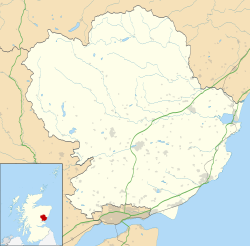Glenesk Folk Museum is a museum located in the Glen Esk valley, in Tarfside, Angus, Scotland.[2] It is about 9 miles (14 km) north of the village of Edzell. It is housed in a former shooting lodge, known as 'The Retreat',[3] which used to belong to the Earls of Dalhousie.[4] The museum contains artefacts and documents related to the history of the surrounding area. It also has a shop selling locally produced gifts and a tearoom. The museum organises demonstrations of local skills and crafts.
 | |
| Established | 1955 |
|---|---|
| Location | Tarfside, Angus, Scotland DD9 7YT |
| Coordinates | 56°53′55″N 2°48′30″W / 56.8987°N 2.8083°W |
| Curator | Dr Christopher Martin [1] |
| Website | http://www.gleneskfolkmuseum.org |
History
editThe Museum was established in 1955 by Greta Michie, a local schoolteacher[5] who was inspired by folk museums in Scandinavia. The building used for the museum, known as 'the Retreat', had been constructed as a retirement cottage in the 1840s by Captain J.E. Wemyss.[6][7] It was later expanded and used as a shooting lodge, and later a summer house by the Earls of Dalhousie, before falling into disuse. Lord and Lady Dalhousie assisted with the establishment of the museum on this site.[6]
The museum was refurbished and expanded in 2007.[7]
Collections
editThe museum's artefacts are arranged thematically into rooms, including spaces covering music and costume. There are reconstructions of rooms from the 1850s, including a children's room.[8] The museum also has a document archive for genealogical research, including Census records from 1841 to 1891 and a partial record of births, marriages and deaths in the Glen and the parishes of Edzell and Lethnot.[6] This room has computers.[8]
The museum has a small collection of musical instruments, highlights of which include a trapezoidal Savart-style violin that was played for many years on the streets of Aberdeen by an itinerant musician, and a coach horn known to have been used locally as late as the 1930s on one of the last horse-drawn stagecoaches operating in the United Kingdom.[9]
Facilities and events
editSince its foundation, the Retreat has sold locally produced goods, and this continues in the gift shop. There is also a cafe offering light refreshments.
The Retreat also has conference facilities, a function room, a nature trail and a children's play area.
Regular craft workshops are run on-site, along with other events which have included music recitals and storytelling.[10]
See also
editReferences
edit- ^ "Meet the Team | Glenesk Folk Museum and Retreat". Glenesk Folk Museum. Wix. Retrieved 12 May 2022.
- ^ Rob Humphreys; Donald Reid (2 May 2011). The Rough Guide to Scottish Highlands & Islands. Rough Guides Ltd. p. 324. ISBN 978-1-4053-8940-2. Retrieved 28 February 2012.
- ^ Alan Murphy (1 October 2001). Scotland Highlands & Islands handbook: the travel guide. Footprint Travel Guides. pp. 169–170. ISBN 978-1-900949-94-1. Retrieved 27 February 2012.
- ^ June Skinner Sawyers (1 August 1999). Maverick Guide to Scotland. Pelican Publishing. p. 234. ISBN 978-1-56554-227-3. Retrieved 27 February 2012.
- ^ "Things to do". Glenesk Retreat and Folk Museum. Archived from the original on 15 January 2012. Retrieved 28 February 2012.
- ^ a b c "Glenesk Museum". AngusGlens. Angus Council. Retrieved 27 February 2012.
- ^ a b "FAQ". Glenesk Retreat and Folk Museum. Archived from the original on 15 January 2012. Retrieved 28 February 2012.
- ^ a b "The Retreat Glenesk" (PDF). The Glenesk Trust. Archived from the original (Leaflet) on 3 March 2016. Retrieved 28 February 2012.
- ^ "Glenesk Retreat and Folk Museum". MINIM-UK. Higher Education Funding Council for England. Retrieved 18 September 2017.
- ^ "Events". Glenesk Retreat and Folk Museum. Archived from the original on 15 January 2012. Retrieved 28 February 2012.
